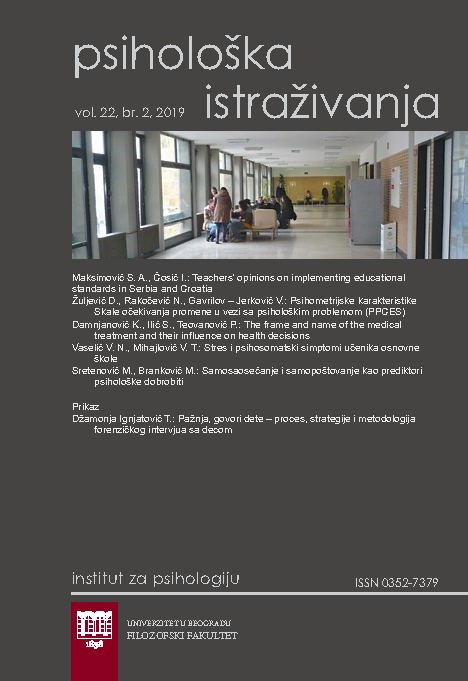Self-compassion and self-esteem as predictors of psychological well-being
Abstract
This paper examines how different conceptualizations of treating oneself, self-esteem and self-compassion relate to various aspects of well-being. Self-compassion is a relatively novel psychological construct and an alternative conceptualization of self-evaluation models which entails a stable sense of self -worth that is not contingent on social approval or particular outcomes, but rather founded on the awareness that one is valuable as a human being. Based on previous research, we expected that self-compassion would predict unique variance in wellbeing, especially eudaimonic well-being. The study was conducted on a sample of 165 participants. The following measures were used in the research: Self – liking/Self – Competence Scale, Self – Compassion Scale, Questionnaire for Eudaimonic Well-Being, Basic Psychological Needs Scale and Pemberton Happiness Index. The results of regression analyses are highly consistent indicating that the examined constructs of self-compassion and self-esteem were statistically equivalent predictors of various aspects of well-being. Although self-compassion makes a small incremental contribution to explaining the total variance, the findings do not speak in favour of a clear distinction between self-compassion and self-esteem as predictors of well-being in general, nor in their specific aspects.
Authors retain the copyright of the published papers and grant to the publisher the nonexclusive right to publish the article, to be cited as its original publisher in case of re-use, and to distribute it in all forms and media. The published articles will be distributed under the Creative Commons Attribution ShareAlike 4.0 International license (CC BY-SA). It is allowed to copy and redistribute the material in any medium or format, and remix, transform and build upon it for any purpose, even commercially, as long as appropriate credit is given to the original
author(s), a link to the license is provided, it is indicated if changes were made and the new work is distributed under the same license as the original. Authors are permitted to deposit the author’s publisher’s version (PDF) of their work in an institutional repository, subject-based repository, author’s personal website (including social networking sites, such as ResearchGate, Academia.edu, etc.), and/or departmental website at any time after publication, with an acknowledgment of its initial publication in this journal.

